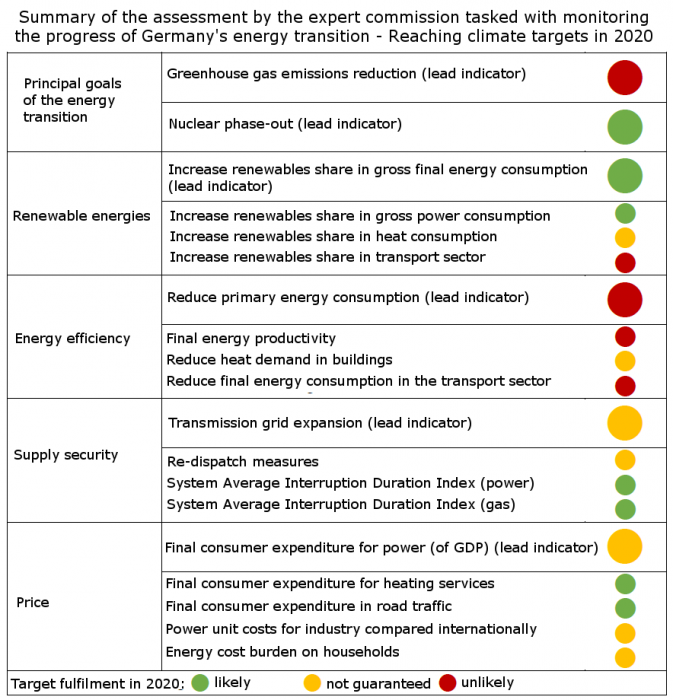Energiewende commission stresses need for action in transport sector
Clean Energy Wire
Germany is likely to miss several of its energy transition goals by 2020, including greenhouse gas reduction and transport sector goals, writes an expert commission tasked with monitoring the progress of the German Energiewende in a short interim evaluation. The "greatest need for action" was in the transport sector. It was not set to increase the renewables share or reduce final energy consumption enough to reach targets by 2020. The experts published their short assessment in time for the ongoing talks to form a new German government coalition, with the aim “to support the upcoming political discussions regarding the effective and efficient development of the energy transition”, says the paper. Germany was on-track to phase out nuclear power and increase the share of renewables in final energy and power consumption. However, the country was unlikely to reduce primary energy consumption by 20 percent by 2020. The commission included several recommendations in the short assessment, and renewed its call for a general price on carbon emissions.
Find the commission’s evaluation in German here.
Find background in the CLEW factsheet Germany’s greenhouse gas emissions and climate targets article Experts call for CO2 price to retain Energiewende’s credibility.
Note: The Clean Energy Wire will publish an article on this story later today.
MDR
A cross-party alliance of eastern German state premiers has warned the federal government that a quick coal exit would have grave consequences for the region’s economy, public broadcaster MDR reports on its website. In a letter to Chancellor Angela Merkel, the heads of government of Germany’s former communist states say that more than two decades after the country’s reunification, east Germany still suffered from a “nearly area-wide structural economic weakness”. They said the situation would be exacerbated by ending lignite mining and coal-fired power production, which employed tens of thousands of people in the region, the MDR writes.
Read the article in German here.
See the CLEW interview with Green MP Baerbock for background on Germany’s coal use.
Die Welt
The storm “Herwart” that hit Germany on the last weekend in October caused power prices to turn negative due to an excessive supply of wind power, thereby exposing “the glaring malfunction” of the country’s energy transition, Nando Sommerfeldt and Holger Zschäpitz write for Die Welt. Power prices during the storm temporarily fell to minus 83.06 euros per megawatt hour (eur/mWh), compared to plus 37 eur/mWh during “normal” times, forcing power producers to pay their customers, the article says. “Private consumers do not benefit from negative prices but instead have to pay for it in the long run,” as the government guarantees operators of renewable energy installations fixed feed-in tariffs, the authors write. Excess power needs to be consumed even when there is no demand, causing prices to turn negative. However, the problem could be remedied by providing greater storage capacities to preserve excess energy for later use, Tobias Struck of energy provider Wemag says.
Read the article in German here.
See the CLEW factsheet Why power prices turn negative for background.
Initiating the end of combustion engine technology in Germany with corresponding legislation would be in accordance with European law, environmental organisation Greenpeace says in a press release. According to a legal opinion commissioned by the organisation, Germany’s ambitious climate protection goals require the government to introduce “regulation aimed at strengthening environmental protection”, which included a national phase-out of combustion engines to foster the transport sector’s emissions reduction. Greenpeace says Germany should ban new registrations of cars with combustion engines by 2025 to guarantee a fulfilment of the Paris Climate Agreement’s goals.
Find the press release in German here and the full legal opinion in German here.
See the CLEW factsheet The debate over an end to combustion engines in Germany for more information.
Rheinische Post
Germany’s environment minister Barbara Hendricks says drivers of large Super Utility Vehicles (SUVs) living in cities should opt for a different model next time they buy a car. Drivers of large cars could be “looked at with disapproval in cities, similar to the way smokers are looked at in inside spaces”, Hendricks told the Rheinische Post in an interview. She stressed that the analogy came from an official of the ADAC, Germany’s largest motorist association. Hendricks added that the Green Party’s demand to ban new registrations of combustion engines by 2030 was unnecessary as market forces ensured that the technology will lose its appeal one way or another over the next decade.
Read the interview in German here.
See this CLEW interview with Hendricks for more information.


